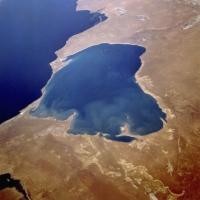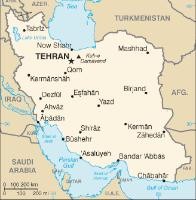Now that the idea of sending more troops to Afghanistan has begun to take hold as an emerging consensus, the number has begun to rise. What began as 20,000 has now become a “window of overall increase” between 20 and 30K, according to JCS Chairman Adm. Mike Mullen in a weekend press conference (via Army Times). Add in support troops and we’ll probably end up at the 40K number that a plugged in contact confided had been circulating around Washington as far back as a month ago. (Remember that the Surge was initially proposed as a 20K troop increase, but […]
Central Asia Archive
Free Newsletter

In the new geostrategic “Great Game” between Russia and the West over the future of Caspian and Central Asian energy resources, the prize resembles a set of traditional matreshka Russian dolls. The outermost doll represents the three nations bordering the Caspian itself — Azerbaijan, , Kazakhstan and Turkmenistan. In the middle of the collection is Uzbekistan, the most populous of the new Central Asian nations. The innermost doll consists of the two most easterly “Stans,” Kyrgyzstan and Tajikistan, rich in hydroelectric potential, but relatively poor in hydrocarbons. As prizes go, it is certainly a tempting one. The Caspian’s 143,244 square […]

To discuss human rights in Central Asia without resorting to stereotype is a difficult prospect. The area’s strategic value is unquestioned. Energy rich, at the nexus of Russia, China, Iran, and Pakistan, quite literally the heartland of the continent, Central Asia remains vitally important to every great power on the planet. That very importance has led some to turn the region’s human rights record into a vehicle for promoting their own interests — distorting reality in the process. While it would be impossible for any Western country to approach Central Asia without taking heed of its many human rights issues, […]

The attacks of 9/11 and the ensuing war in Afghanistan did not start the new “Great Game” in Central Asia. Local governments had already grasped the Islamist threat, as well as Russia’s neo-imperial longings to dominate the region. Central Asia’s great energy stakes, meanwhile, had already determined American resistance to Moscow’s policy. However those events undoubtedly imparted a pronounced military aspect to the great power rivalry for political influence and energy access there. Since 2001, the U.S., Russia, Germany, France and India have all acquired local military bases, and their uses or potential missions have grown in importance (although France’s […]

While many observers of U.S. foreign policy have in recent years lamented the state of U.S. public diplomacy, Radio Free Europe/Radio Liberty is widely seen as a bright spot amid a dim post-Cold War record of communicating and promoting U.S. values and interests to the world outside the United States. Radio Free Europe/Radio Liberty serves as a “surrogate” free press in countries around the world where such doesn’t exist, charged with promoting “democratic values and institutions by disseminating factual information and ideas,” as its mission statement puts it. Through the Internet and over the radio, RFE/RL broadcasts in 28 languages […]

When formulating a practical and forward looking policy towards Iran, which marks the 30th anniversary of its Islamic revolution this February, the Obama administration would do well to heed certain realities. Thirty years of muscular posturing by five successive administrations have not afforded the White House a handle on the Islamic Republic. Neither have they ushered in a new dawn of Middle Eastern stability or, for that matter, Israeli security. Instead, the United States must lead the way in establishing a strategic partnership with the Islamic Republic of Iran, in the context of a more engaged foreign policy. Iran is […]
